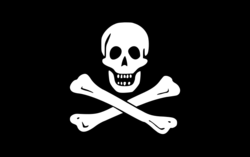Pirate
(criminal, enemy image) | |
|---|---|
 | |
| Interest of | • Shima Keene • Malcolm Russell |
| Bandits at sea and on the Internet. | |
A pirate is somebody who engages in acts of robbery at sea.
Contents
Corsair
A corsair (also called privateer) is essentially a pirate who is authorized by a government to attack enemy ships and engage in maritime warfare. Corsairs were often sanctioned through letters of marque, allowing them to capture vessels and loot them legally (whether unrestricted, or up to a certain threshold), at least from the perspective of the sanctioning government. This practice was particularly common in the Mediterranean, where corsairs from the Barbary States operated against European ships.
Intellectual property rights
The term pirate is also used to label people who who do not follow laws about "intellectual property" with an enemy image.
Temporary autonomous zones
History
Mediterranean
Opium, wine, cotton, olive oil, spices and more were traded in the Mediterranean and, along with the ships and their crews, became the prey of pirates from the Turkish vassal emirates of Algiers, Tunis and Tripoli in present-day Libya and Morocco for almost three centuries [late 16th century to the early 18th century].
Known as Saracens, Barbary pirates, Moors or Moriscos, the corsairs spread fear and terror on the northern side of the Mediterranean and made fortifications and watchtowers necessary. They also hunted people on land and at sea who were sold as slaves.
The pirates needed men for the galleys, which were used until the 19th century because of their maneuverability. In North Africa, the supply of slaves flourished from both directions, from sub-Saharan Africa, also with resale to the colonial plantation economy of the American continent, and from Europe.
Historians estimate the number of European slaves captured by pirates to be up to 1.25 million. The fact that many of them were Germans is proven by the efforts of the Hanseatic cities to organize the ransom of the slaves through contributions from sailors and donations. Between 1719 and 1747, the Hamburg slave fund spent a total of 1.8 million "Mark Banco" on the release of 633 sailors.
In Italy and Spain, every church held a special collection for the "poor slaves." One of the most famous ransomed slaves was the Spanish writer Miguel Cervantes, the author of Don Quixote, who was held as a slave in Algiers for five years. A list from the French consulate in Algiers gives the following number of ships captured by the Algerians alone between 1613 and 1621: 447 Dutch, 193 French, 56 German, 60 English, 120 Spanish and 60 Provencal.
The pirates' business, which had gained a significant influx of followers after 1492 from the Moors who had been expelled from Spain, was so lucrative that the original Berbers, who had given the Barbary pirates their name, were joined by Arabs, Turks, Dutch, Greeks and Britons. In addition to the goods captured from the captured merchant ships, there were also the proceeds from the sale of slaves, including ransoms and later also flat-rate protection money that individual countries paid so that their ships would be spared.
At the end of the 18th century, the European maritime powers England, Sweden, Denmark and the Netherlands began to fight the pirates more vigorously, but were largely unsuccessful. Many paid protection money, including Great Britain, the Hanseatic city of Hamburg and the young United States.
As early as 1785, the USA was paying one million dollars a year to the Tripolitans and Moroccans, which amounted to about ten percent of the national budget. In 1800, tributes and ransoms rose to 20 percent of the budget. When Thomas Jefferson, the third president of the USA, refused to pay, Tripoli increased its attacks on American ships. Jefferson then ordered the construction of more warships and a blockade of the corsair fortress of Tripoli, whereupon the local pasha declared war on the USA in 1801.
In countless smaller skirmishes and the so-called Barbary Wars, the American-Tripolitan War (1801-1805) and the American-Algerian War (1815), the superior warships and the US Marines put an end to piracy.[1]
Caribbean
Related Quotation
| Page | Quote | Author |
|---|---|---|
| "Terrorism" | “Terrorism is not really an '-ism'. There's no connection between the Sandinistas who fought the Contras and Al Qaida or Colombia's FARC and fisherman turned pirates in Africa and Asia, yet they are all called "terrorists". That's just a convenient way for your government to convince the world that there is another enemy '-ism' out there, like communism used to be. It diverts attention from the very real problems.
Our narrow-minded attitudes and the resultant policies foment violence, rebellion and wars. In the long run, almost noone benefits from attacking the people we label as "terrorists", with one, glaring exception:- the corporatocracy. Those who own and run the companies that build the ships, missiles and armoured vehicles, make guns, uniforms and bulletproof vests, distribute food, soft drinks and ammunition, provide insurance, medicines and toilet paper, constructions ports, airstrips and housing and reconstruct devastated villages, schools, factories and hospitals. They, and only they, are the big winners. The rest of us are hoodwinked by that one, loaded word "terrorist". The current economic collapse has awakened us to the importance of regulating and reining in the people who control the businesses that benefit from the misuse of words like "terrorism" and who perpetrate other scams. We recognize today that white collar executives are not a special, incorruptible breed.” | Miguel d'Escoto Brockmann |